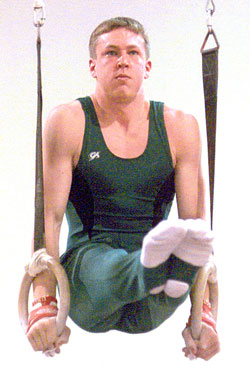There is no one trait that determines what makes a good leader, management professors say. A title in front of your name, such as Student Union president, doesn’t necessarily make someone a leader.

Yet there are some people who are more effective leaders than others. David Ader — who was president of WUSTL’s Student Union for two years — falls into that category.
“He has an authentic style of leadership,” says Jackson A. Nickerson, Ph.D., professor of organization and strategy. “He cares about people and he truly wants to accomplish good things. And he does.”
Nickerson got to know Ader in 2004-05 when they served on the search committee for a new dean of the Olin School of Business, and also when Ader was one of his students. He also interacted with Ader on Undergraduate Council and advised him for a practicum project for Monsanto.
The two joined forces to persuade the University that the parking lot in front of Simon Hall presented a potential hazard to student safety. Their efforts resulted in speed bumps to slow cars down and a new fence around the lot to prevent students from cutting through.
“He has good taste for which problems to address, and my sense is that he’s been successful,” Nickerson says. “He introduced a novel approach for communicating with students using WUTV on Monday nights. He has true concern for people; he wouldn’t be coaching gymnastics to little kids if he didn’t care about people.”
Ader also wouldn’t be coaching gymnastics to little kids if he didn’t practice the sport himself. He competed in gymnastics throughout his childhood in his hometown of Strongsville, Ohio.
At the peak of his career, he competed on the vault with a laid-out Tsukahara — a whirling, twisting flip. When considering where to go to college, he looked for schools that had a gymnastics program.

“Freshman year I was on the club team,” Ader says. “I was the only guy on the team. It was fun; we traveled all over the place for competitions.
“But the more I became involved in Student Union, the more difficult it was to stay on the team. I knew that I would only have the opportunity to hold a leadership role on campus once.
“So, I started coaching for an area gym (the St. Louis Gymnastics Centre) and got more involved in student politics.”
Ader knows he made the right choice. “I loved every second of it,” he says.
Ader’s ardor for his involvement was probably enhanced because he had some unusual opportunities; the biggest of which was speaking at the 2004 presidential debate held at the University. Don’t worry if you missed seeing him on national television; his big moment happened before the event went on the air.
“I got to meet both candidates,” Ader recalls. “Then, before the debate went live — although, it was being broadcast on C-SPAN — I got to go on stage, welcome the audience to the University and introduce the chancellor (Mark S. Wrighton). That was a really cool experience.”
It wasn’t all glamour, Ader says. He was surprised by the amount of advising and mentoring involved in being the Student Union president, and he had to learn to work with University administrators on their level. As he advanced through the B.S.B.A. program in the Olin School, he also grew increasingly aware of how his course work could be applied to his involvement with the student government.
“Learning how to motivate people and how to set goals has definitely been an advantage,” Ader says. “Last year, we had a practicum team from the business school that worked with Glenn MacDonald (Ph.D., senior associate dean and the John M. Olin Distinguished Professor of Economics and Strategy) to advise the Student Union. It’s another way we bridged the gap between the business school and the Student Union.”
|
Olin School of Business |
The connection wasn’t lost on Ader’s peers, either. Ed Banti, a fellow Student Union member who will graduate today with a bachelor’s degree in computer science, says Ader’s strongest quality is the way he thinks and approaches problems.
“I’ve seen him in action in a lot of meetings,” Banti says. “He listens to discussions that seem completely disjointed and after a while he raises his hand.
“Everyone stops talking and he says, ‘What exactly is the problem?’ And then he’ll list out the main points he’s heard and focus the discussions of both the students and administrators.”
Armed with his innate abilities and the skills he acquired at the University, Ader is ready to apply them to his post-University life. After receiving his undergraduate business degree today, he has a consulting job waiting for him at Deloitte in Chicago.